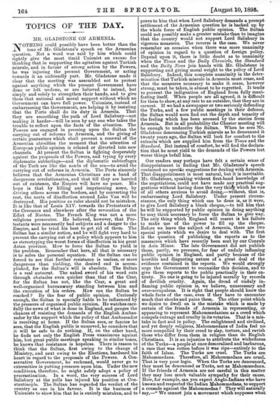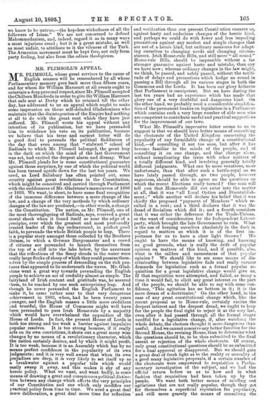TOPICS OF THE DAY.
MR. GLADSTONE ON ARMENIA. NOTHING could possibly have been better than the tone of Mr. Gladstone's speech on the Armenian question. Not a word was said by him which could rightly give the most timid Unionist an excuse for thinking that in supporting the agitation against Turkish misrule, and in favour of strong action by the Powers, he was injuring the present Government, or acting towards it an unfriendly part. Mr. Gladstone made it clear that the meeting was assembled not to protest against anything which the present Government have done or left undone, or are believed to intend, but simply and solely to strengthen their hands, and to give them that national and moral support without which no Government can have full power. Unionists, instead of embarrassing the Government, are helping it by insisting that the Porte shall do its duty in Armenia. That they are smoothing the path of Lord Salisbury—not making it harder—will be seen by any one who takes the trouble to reflect upon the facts of the situation. The Powers are engaged in pressing upon the Sultan the carrying out of reforms in Armenia, and the giving of certain guarantees which shall prevent a renewal of the Armenian atrocities the moment that the attention of European public opinion is relaxed or diverted into new channels. At present the Sultan is fighting desperately against the proposals of the Powers, and trying by every diplomatic subterfuge—and the diplomatic subterfuges of the Turk are like the sands of the sea—to avoid the carrying out of reforms in Armenia. The Porte sincerely believes that the Armenian Christians are a band of dangerous revolutionaries, and that till they are harried out of existence, the Empire will have no peace. His hope is that by killing and imprisoning some, by driving others across the borders, and by converting the rest, the nests of disaffection around Lake Van will be destroyed. His position as ruler should not be mistaken. It is like that of Louis XIV. towards the Protestants of the Cevennes and elsewhere after the revocation of the Edict of Nantes. The French King was not a mere religious persecutor. He believed, however, that Pro- testants were necessarily bad subjects and a danger to the Empire, and he tried his beat to get rid of them. The Sultan has a similar notion, and be will fight very hard to prevent the carrying out of a policy which appears to him as stereotyping the worst forms of disaffection in his great Asian province. How to force the Sultan to yield is the problem. Remember that here, all that is necessary is to solve the personal equation. If the Sultan can be forced to see that further resistance is useless, or more dangerous than yielding, the desired end is accom- plished, for the Sultan's will is absolute. The Sultan is a real autocrat. The naked sword of his word cuts through obstacles even quicker than that of the Czar, for the Sultan has not, like the Czar, a great and well-organised bureauoracy standing between him and the execution of his orders. How can the Sultan be reached ? By the fear of public opinion. Curiously enough, the Sultan is specially liable to be influenced by the pressure of organised public opinion. He watches care- fully the news of what is done in England, and gauges the chances of resisting the demands of the English Ambas- sador by the support which the policy of that Ambassador is receiving at home. If the Sultan sees, or fancies he sees, that the English public is unmoved, he considers that it will be safe to do nothing. If, on the other hand, he finds not only the English Press unanimous against him, but great public meetings speaking in similar tones, he knows that resistance is hopeless. There is reason to think that the Sultan, first owing to the change of Ministry, and next owing to the Elections, hardened his heart in regard to the proposals of the Powers. A Con- servative Government, he reckoned, would never go to extremities in putting pressure upon him. Under the new conditions, therefore, he might safely adopt a policy of procrastination. In a word, the very success of Lord Salisbury at the polls has injured his position at Con- stantinople. The Sultan has regarded the verdict of the country as one in his favour. It is the business of Unionists to show him that he is entirely mistaken, and to prove to him that when Lord Salisbury demands a prompt- settlement of the Armenian question he is backed up by the whole force of English public opinion. The Sultan could not possibly make a greater mistake than to imagine that the country would not support Lord Salisbury in vigorous measures. The reverse is the case. We never- remember an occasion when there was more unanimity of opinion in regard to a question of foreign policy. Depend upon it, there is little doubt as to unanimity when the Times and the Daily Chronicle, the Standard and the Daily News join hands with Mr. Gladstone in supporting and giving moral weight to the policy of Lord Salisbury. Indeed, this complete unanimity in the deter- mination that Turkish misrule in Armenia must cease, and that the measures necessary to make it cease, however strong, must be taken, is almost to be regretted. It tends to prevent the indignation of England from fully mani- festing itself. When people are all agreed, it is difficult for them to show, at any rate to an outsider, that they are in earnest. If we had a newspaper or two seriously defending the Turks, and a few public meetings in their defence, the Sultan would soon find out the depth and tenacity of the feeling which has been aroused by the stories from Armenia. But in all probability the Chester meeting will be enough to undeceive the Sultan. When he sees Mr. Gladstone denouncing Turkish misrule as he denounced it twenty years ago, the Sultan will look for comfort to the extracts which are supplied him from the Times and the Standard. But instead of comfort, he will find the declara- tion that he must yield to the demauds of the Powers lest worse things befall him.
Our readers may perhaps have felt a certain sense of disappointment in finding that Mr. Gladstone's speech contained no specific suggestions for dealing with Armenia. That disappointment is most natural, but it is inevitable. Mr. Gladstone, speaking without first-hand knowledge of the negotiations, could not have made any practical sug- gestions without having done the very think which he was of all others anxious to avoid doing,—without, that is, embarrassing Lord Salisbury. Under present circum- stances, the only thing which can be done is, as it were, to give Lord Salisbury a blank cheque,—to tell him that he will be supported by public opinion in doing anything he may think necessary to force the Sultan to give way. The only thing which England will resent is his failure to make use of the power to fill up the cheque. Before we leave the subject of Armenia, there are two special points which we desire to deal with. The first is the question of publishing the reports as to the massacres which have recently been sent by our Consuls in Asia Minor. The late Government did not publish these, partly, we presume, for fear of unduly inflaming public opinion in England, and partly because of the horrible and disgusting nature of a great deal of the evidence contained in the reports. We would strongly urge the Government to reconsider this decision, and to give these reports to the public practically in their en- tirety. No one is going to be injured morally by records of devilish cruelty. Again, the dread of unduly in- flaming public opinion is, we believe, unnecessary and over-scrupulous. It is right that people should know the- whole facts of the case, even if they have to encounter- much that shocks and pains them. The other point which we desire to dwell on is the mistake which is made by certain of the friends of Armenia in representing, or appearing to represent Mahommedanism as a creed which compels outrage and cruelty in its votaries. That is a mis- take in fact and in policy. The enlightened and civilised, and yet deeply religious, Mahommedans of India feel no. more compelled by their creed to slay, torture, and ravish those who differ from them in religion than do English Christians. It is an injustice to attribute the wickedness. of the Turks—a people at once demoralised and barbarous,„ a race that was rotten before it was ripe—entirely to the faith of Islam. The Turks are cruel. The Turks are Mahommedans. Therefore, all Mahommedans are cruel.. That is very poor logic. When the Turks are denounced,. they must be denounced as Turks, not as Mahommedans. If the friends of Armenia are not careful in this matter they may lose much valuable sympathy for their cause. How, for example, can you expect Anglo-Indians who have known and respected the Indian Mahommedans, to support a crusade against the Mahommedan ? They will naturally say,—" We cannot join a movement which supposes what we know to be untrue,—the hopeless wickedness of all the followers of Islam." We are not concerned to defend Mahommedanism, and, indeed, regard it as in many ways a most injurious creed ; but it is a great mistake, as well as most unfair, to attribute to it the vileness of the Turk. The Armenian movement must be kept free, not only from party feeling, but also from the odium theologicum.



































 Previous page
Previous page